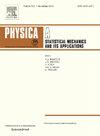基于声誉的策略持久性和环境反馈促进了空间雪堆游戏中的合作
IF 3.1
3区 物理与天体物理
Q2 PHYSICS, MULTIDISCIPLINARY
Physica A: Statistical Mechanics and its Applications
Pub Date : 2025-10-22
DOI:10.1016/j.physa.2025.131061
引用次数: 0
摘要
在复杂的人类社会环境中,个体倾向于模仿那些既能获得高收益又能获得高声誉的人,而不是那些获得低收益却能保持好声誉的好人。通常情况下,个人声誉并不会随着他/她的策略的持久性而均匀变化。同时,环境声誉产生于这些个人声誉,并反过来影响个人策略的持久性。在此背景下,我们将策略持续性和环境反馈纳入空间漂移博弈中,探讨在这两种机制下个体声誉如何影响行为选择和促进社会合作。具体而言,我们首先将高收益个体定义为收益超过社区平均水平的个体,然后使用指数函数表征个体声誉的非线性动态,最后构建基于局部和全局声誉的环境反馈函数。仿真结果表明,高收益和策略持续性增强的个体声誉有利于合作行为的传播。此外,在环境反馈机制中,增加对当地邻居声誉的重视,减少对全球人口声誉的考虑,显著提高了系统内的合作水平。本文章由计算机程序翻译,如有差异,请以英文原文为准。
Reputation-based strategy persistence and environmental feedback promote cooperation in spatial snowdrift games
In complex human social environments, individuals tend to emulate those who achieve both high benefits and high reputations, rather than nice guys who maintain good reputations despite obtaining low benefits. Typically, individual reputation does not vary uniformly with the persistence of her/his strategies. Meanwhile, environmental reputation emerges from these individual reputations and in turn influences the persistence of individual strategies. Motivated by these facts, we incorporate strategy persistence and environmental feedback into the spatial snowdrift game to investigate how individual reputation affects behavioral choices and promotes social cooperation under these dual mechanisms. Specifically, we first define high-benefit individuals as those whose payoffs exceed the community average, then characterize the nonlinear dynamics of individual reputation using an exponential function, and finally construct an environmental feedback function based on local and global reputations. Simulation results demonstrate that enhanced individual reputation reinforced by high benefits and strategic persistence facilitates the propagation of cooperative behaviors. Moreover, increasing emphasis on local neighbor reputation while reducing consideration of global population reputation in environmental feedback mechanisms significantly promotes cooperation levels within the system.
求助全文
通过发布文献求助,成功后即可免费获取论文全文。
去求助
来源期刊
CiteScore
7.20
自引率
9.10%
发文量
852
审稿时长
6.6 months
期刊介绍:
Physica A: Statistical Mechanics and its Applications
Recognized by the European Physical Society
Physica A publishes research in the field of statistical mechanics and its applications.
Statistical mechanics sets out to explain the behaviour of macroscopic systems by studying the statistical properties of their microscopic constituents.
Applications of the techniques of statistical mechanics are widespread, and include: applications to physical systems such as solids, liquids and gases; applications to chemical and biological systems (colloids, interfaces, complex fluids, polymers and biopolymers, cell physics); and other interdisciplinary applications to for instance biological, economical and sociological systems.

 求助内容:
求助内容: 应助结果提醒方式:
应助结果提醒方式:


